|
|
|
Sort Order |
|
|
|
Items / Page
|
|
|
|
|
|
|
| Srl | Item |
| 1 |
ID:
027053
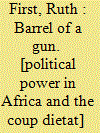

|
|
|
|
|
| Publication |
London, AllentLane Penguin Press, 1970.
|
| Description |
xiii, 513p.hbk
|
| Standard Number |
0713901632
|
|
|
|
|
|
|
|
|
|
|
|
Copies: C:1/I:0,R:0,Q:0
Circulation
| Accession# | Call# | Current Location | Status | Policy | Location |
| 005783 | 960/FIR 005783 | Main | On Shelf | General | |
|
|
|
|
| 2 |
ID:
119924
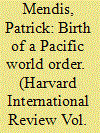

|
|
|
|
|
| Publication |
2012.
|
| Summary/Abstract |
In his re-election night speech in November 2012, President Barack Obama said, "Democracy in a nation of 300 million can be noisy and messy and complicated. We have our own opinions. . . These arguments we have are a mark of our liberty, and we can never forget that as we speak, people in distant nations are risking their lives right now just for a chance to argue about the issues that matter-the chance to cast their ballots like we did today." Soon after the US election, one such distant nation experienced a very different transfer of political power, as current Chinese President Xi Jinping replaced former President Hu Jintao in an orderly, stable, and Confucian manner.
|
|
|
|
|
|
|
|
|
|
|
|
|
|
|
|
| 3 |
ID:
157220
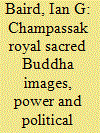

|
|
|
|
|
| Summary/Abstract |
What is the relationship between Buddha images and the legitimization of political power over space? What understandings exist amongst royals concerning regaining spatial power associated with Buddha images? This article considers these questions with a particular focus on the Champassak Royal House, a royal family that was originally spatially constituted through the territorial control it had over present-day southern Laos and some neighbouring areas. To do this, the article draws upon two case studies, one centred on an important Buddha image in the 18th century, the other more contemporary and linked to Buddha images and exiled members of the Champassak Royal House. Buddha images have long played an important role in constituting and defining sacred geographies, and thus political power, in Champassak, as has similarly been the case in other parts of mainland Southeast Asia.
|
|
|
|
|
|
|
|
|
|
|
|
|
|
|
|
| 4 |
ID:
108217
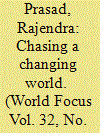

|
|
|
| 5 |
ID:
172806
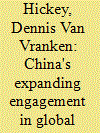

|
|
|
|
|
| Summary/Abstract |
FOR MOST OF THE NINETEENTH AND MUCH OF THE TWENTIETH CENTURY, CHINA was called, "the sick man of Asia (东亚病夫, dong ya bing fu)."1 But those days are over. As President Xi Jinping observed, "China has bid farewell to the problems that plagued its people for thousands of years, including hunger, shortages and poverty" (Yu 2019, 19). As described below, China is now one of the world's top economic, political and military powers.
|
|
|
|
|
|
|
|
|
|
|
|
|
|
|
|
| 6 |
ID:
132536
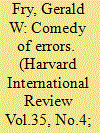

|
|
|
|
|
| Publication |
2014.
|
| Summary/Abstract |
Political crises are nothing new for Thailand. Since becoming a constitutional monarchy in 1932, the country has faced numerous political crises, including a 1973 student revolution to overthrow a military dictatorship, the storming of Thammasat University and the installation of an extremely right-wing government in 1976, and the people power victory over General Suchinda in 1992. In September 2006, a military coup deposed the former prime minister, Dr. Thaksin Shinawatra. In retaliation against the coup, Thaksin supporters in 2006 formed the United Front for Democracy against Dictatorship (UDD), a political pressure group whose supporters are commonly called Red Shirts.
|
|
|
|
|
|
|
|
|
|
|
|
|
|
|
|
| 7 |
ID:
108649
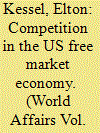

|
|
|
|
|
| Publication |
2011.
|
| Summary/Abstract |
Elton Kessel describes the role of competition in a free market economy, contrasting its place in the financial sector as financial firms move from a monopoly position in initiating innovative financial procedures to an oligopolistic position as competitors adopt the same procedures. The motivation is abnormal profits. Enormous profits among a relatively small number of firms have led to political power making it unlikely for states or international organisations to secure legislative control of these firms.
|
|
|
|
|
|
|
|
|
|
|
|
|
|
|
|
| 8 |
ID:
126402
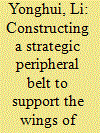

|
|
|
| 9 |
ID:
131414
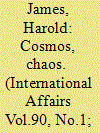

|
|
|
|
|
| Publication |
2014.
|
| Summary/Abstract |
The article explores parallels between the fragility of globalization on the eve of the First World War, in the aftermath of the financial crisis of 1907, and today's crisis of globalization following the post-2007 recession. The fragility and interconnectedness of the international economy in both cases could provide a basis for an economic-military strategy. The temptation of using economic connectedness as a substitute for conventional and costly military strategy makes this course particularly attractive to a hegemon-the UK then, the US now-that is facing powerful competition from rising powers (Germany and the US then, China now). The challengers are likely to find their own alternative strategy, and the result breeds uncertainty. In consequence, rule-based international orders are generally strained by transitions of power, even though all the parties see the desirability and need for a common system of rules
|
|
|
|
|
|
|
|
|
|
|
|
|
|
|
|
| 10 |
ID:
133923
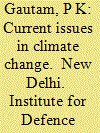

|
|
|
|
|
| Publication |
New Delhi, Institute for Defence Studies and Analyses, 2014.
|
| Description |
93p.Pbk
|
| Series |
IDSA Occasional Paper No.34
|
| Standard Number |
9789382169413
|
|
|
|
|
|
|
|
|
|
|
|
Copies: C:2/I:0,R:0,Q:0
Circulation
| Accession# | Call# | Current Location | Status | Policy | Location |
| 057882 | 304.25/GAU 057882 | Main | On Shelf | General | |
| 057883 | 304.25/GAU 057883 | Main | On Shelf | General | |
|
|
|
|
| 11 |
ID:
128523
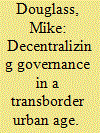

|
|
|
|
|
| Publication |
2013.
|
| Summary/Abstract |
The devolution of political power to local governments is taking new directions as cities begin to look beyond national borders to create economic synergies with city regions in other countries rather than continuing to look to linkages with their capital cities for economic benefits. In East Asia the search for transborder urban linkages comes at a time when secondary cities in higher income countries are confronting major social and economic transformations. These new trends include: the rise of China in the global economy, the turn toward neoliberal downsizing of government, demographic transitions toward declining, rapidly aging populations with a diminishing labour force compensated partly by the large-scale recruitment of foreign workers and foreign spouses. The combined result of the new dynamics is that just when political power is being devolved to the urban scale, the global trend of "shrinking cities" has reached them. The discussion focuses on recent initiatives of the local governments of Busan,OLYMPUS DIGITAL CAMERA South Korea, and Fukuoka, Japan, to build a "common living sphere" through transborder linkages to provide a culturally rich, people-centered alternative that contrasts with the high-technology industrial clusters being planned for them from their corporatized capital cities. In addition to economic issues, cities engaged in such transborder initiatives challenge the meaning of national borders and citizenship while also confronting new issues in accommodating the appearance of multicultural societies, which have all remained outside of mainstream discussions on decentralization.
|
|
|
|
|
|
|
|
|
|
|
|
|
|
|
|
| 12 |
ID:
193140
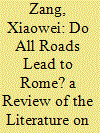

|
|
|
|
|
| Summary/Abstract |
Political elites have a tremendous influence on past, present and future socioeconomic and political developments in both western and non-western countries. Unsurprisingly, the analysis of China’s elites has been crucial in the study of politics there. A large body of literature has examined the members of the Central Committee of the Chinese Communist Party, a stronghold of the nation’s political elites. Given the growing interest and research on elite politics in the PRC in recent years, this paper reviews studies of the pathways to political power and the personal qualifications of the members of the Central Committee that are central to studies of elite Chinese politics. This review paper is organized both chronologically and thematically. It shows a shift away from the study of demographics of Central Committee members toward theorizing of how recruitment into the Central Committee works. Some scholars have theorized succession politics in China as the rise of technocracy, while others have used institutionalization and factional politics to explain how China’s leaders are selected. This paper summarizes and identifies several theoretical and methodological issues in existing studies as an effort to advance research on succession politics and political evolution in China.
|
|
|
|
|
|
|
|
|
|
|
|
|
|
|
|
| 13 |
ID:
171340
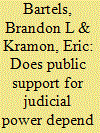

|
|
|
|
|
| Summary/Abstract |
Judicial power is central to democratic consolidation and the rule of law. Public support is critical for establishing and protecting it. Conventional wisdom holds that this support is rooted in apolitical factors and not dependent on who is in political power. By contrast, we argue that support may be driven by instrumental partisan motivations and therefore linked to partisan alignment with the executive. We test the argument with survey evidence from 34 African countries. To provide causal evidence, we conduct difference-in-differences analyses leveraging Ghana’s three presidential transitions since 2000. Across Africa, support for judicial power is high, while trust in courts is lower. However, presidential co-partisans are less supportive of horizontal judicial power over the president and more supportive of vertical power over the people. The article demonstrates the importance of partisan alignment with the executive in shaping support for judicial power, with implications for judicial behavior and legitimacy.
|
|
|
|
|
|
|
|
|
|
|
|
|
|
|
|
| 14 |
ID:
039417
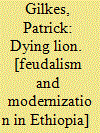

|
|
|
|
|
| Publication |
London, Julian Friedmann Publishers, 1974.
|
| Description |
xix, 307p.hbk
|
| Standard Number |
0904130053
|
|
|
|
|
|
|
|
|
|
|
|
Copies: C:1/I:0,R:0,Q:0
Circulation
| Accession# | Call# | Current Location | Status | Policy | Location |
| 016190 | 963/GIL 016190 | Main | On Shelf | General | |
|
|
|
|
| 15 |
ID:
112442
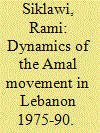

|
|
|
| 16 |
ID:
128173
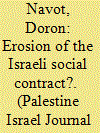

|
|
|
|
|
| Publication |
2012.
|
| Summary/Abstract |
Instead of alternating between withdrawal and neoliberalism, the younger generation should reformulate a new agenda based on a vision for a "just society.
|
|
|
|
|
|
|
|
|
|
|
|
|
|
|
|
| 17 |
ID:
130940
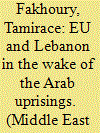

|
|
|
|
|
| Publication |
2014.
|
| Summary/Abstract |
Lebanon is a multisectarian state in which Muslim and Christian groups share political power. The executive elite is composed of a Maronite president, a Shiite speaker of parliament and a Sunni prime minister. The legislature is split 50-50 between Muslims and Christians, and communities enjoy educational and religious autonomy. Two pacts act as regulatory frameworks for these political arrangements: the 1943 National Pact and the 1989 Taif agreement, which put a halt to Lebanon's 15-year civil war (1975-90).
While Lebanon's prewar political system (1943-75) was often framed as a paradigmatic case of consociational or power-sharing democracy,1 most observers today agree that this system is an anarchistic model for the devolution of power. 2 Sectarian3 politics feeds on patronage ties and foreign alliances through which communities vie for control over resources. It further reifies partisanship in external conflicts.
|
|
|
|
|
|
|
|
|
|
|
|
|
|
|
|
| 18 |
ID:
148665
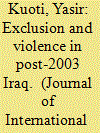

|
|
|
|
|
| Summary/Abstract |
This paper examines the origins of political violence in Iraq. It argues that, in the wake of the democratic transition process in from 2004 to 2005, Iraqi exiles, who were chiefly Shiite Muslims and Kurds appointed by Paul Bremer, Iraq’s U.S. civilian administrator, moved to write a constitution and set up a political system that deliberately marginalized minorities. Since then, the Sunni minority began and continues to engage in or support violence against the state. It suggests that violence and instability in Iraq are to be understood in terms of local contexts of meaning, notably the nature of struggle for political power.
|
|
|
|
|
|
|
|
|
|
|
|
|
|
|
|
| 19 |
ID:
107215


|
|
|
| 20 |
ID:
111717
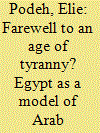

|
|
|
|
|
| Publication |
2012.
|
| Summary/Abstract |
When Hosni Mubarak, looking out of a palace window, saw the demonstrators down below on January 25, 2011, he turned to his advisor and exclaimed: "My God! It's a revolt!" "No, my President," was the answer, "that is a revolution." Well, alright, this legendary quote is usually attributed to French King Louis XVI, on July 14, 1789.1 Yet, judging by the mild response of the Egyptian police forces it is possible that, like his European predecessor, Mubarak did indeed underestimate the significance of the events unfolding before his eyes. The parable draws our attention to the important distinction between a revolt, a takeover and a coup on the one hand, and a revolution on the other.
|
|
|
|
|
|
|
|
|
|
|
|
|
|
|
|
|
|
|
|
|